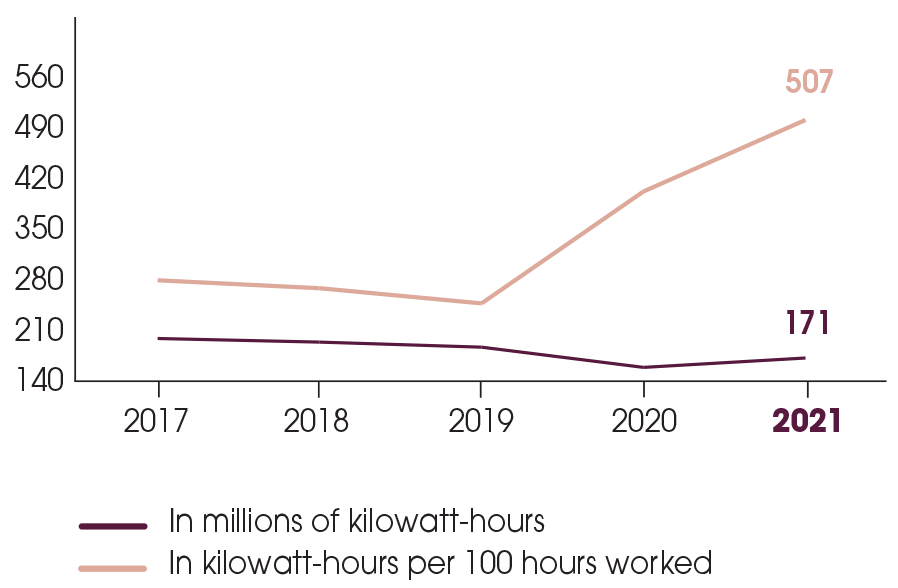AT ADMINISTRATIVE SITES AND RESEARCH CENTRES
As part of the L’Oréal for the Future programme, the Group has set itself a new target for 2030: to reduce the energy consumption of administrative sites and research centres by 40% per 100 hours worked, compared to 2019.
Total water consumption in the administrative sites and research centres was 170,582 megawatt-hours for 2021, a decrease of 9% in absolute value compared to 2019.
In 2021, the total energy consumption of the administrative sites and research centres was 507 kilowatt-hours per 100 hours worked, a 98% increase compared to 2019 (increase of 21% compared to 2020).
These results are primarily linked to the effects of the Covid-19 health crisis, which led to the complete or partial closure of several sites around the world, resulting in a decrease in hours worked on-site of 54% compared to 2019 (a 13% decrease compared to 2020). This difference between the decrease in hours worked on-site and the consumption of energy is primarily linked to the nature of activities that continued on the sites (laboratories, pilots, etc.), which are energy consuming.

TOTAL ENERGY CONSUMPTION OF ADMINISTRATIVE SITES AND RESEARCH CENTRES IN KILOWATT-HOURS

This graph shows the total energy consumption of administrative sites and research centres in kilowatt-hours.
In millions of kilowatt-hours:
- 2017: approximately 207
- 2019: approximately 201
- 2021: 171
In kilowatt-hours per 1,000 finished products:
- 2017: approximately 280
- 2019: approximately 262
- 2021: 507
TOTAL ENERGY CONSUMPTION OF ADMINISTRATIVE SITES AND RESEARCH CENTRES IN KILOWATT-HOURS
DATA ON CONSUMPTION WITH AN IMPACT ON CLIMATE CHANGE
| Administrative sites and research centres | Industrial sites | |||
|---|---|---|---|---|
| 2020 | 2021 | 2020 | 2021 | |
| Renewable electricity (MWh) | 103,834 | 108,888 | 372,693 | 390,736 ☑ |
| Biogas (MWh) | 5,180 | 20,220 | 96,352 | 166,389 ☑ |
| Other renewable energies (MWh)(1) | 9,455 | 10,831 | 59,064 | 68,325 |
| Total renewable energy consumption (MWh) | 118,469 | 139,939 | 528,109 | 625,450 ☑ |
| Non-renewable electricity (MWh) | 10,756 | 8,396 | 15,266 | 15,046 ☑ |
| Gas (MWh) | 18,977 | 4,838 | 175,912 | 122,797 ☑ |
| Fuel (MWh) | 141 | 151 | 6,634 | 5,889 ☑ |
| Other non-renewable energies (MWh)(2) | 13,962 | 17,258 | 12,667 | 14,029 |
| Total non-renewable energy (MWh) | 43,836 | 30,643 | 210,479 | 157,761 ☑ |
| TOTAL ENERGY CONSUMPTION (MWH) | 162,305 | 170,582 | 738,588 | 783,211 ☑ |
☑ The Statutory Auditors have expressed reasonable assurance with regard to this indicator.
(1)Biomass including wood and wood waste; biofuels; solar thermal energy; renewable heat cooling and steam networks
(2)Non-renewable heat cooling and steam networks.
